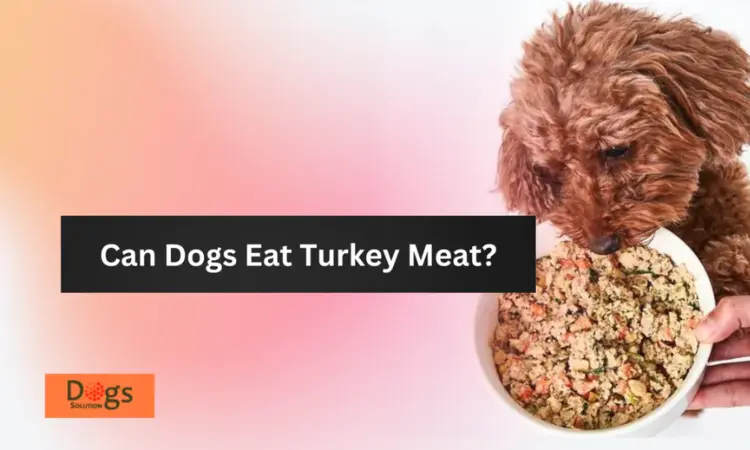American households typically serve turkey as the main appetizer for Thanksgiving and Christmas. Furthermore, although birds are promoted as low-fat proteins for humans, our furry companions have a more complicated situation. You may wonder if you can give your dog a piece of the turkey from your delicious turkey dinner or sandwich. Or how about a piece of lunch meat from turkey? Turkey is generally healthful and safe for dogs, but certain restrictions exist. Here’s some information about feeding your dog turkey, including whether to give them ground turkey, jerky, breast meat, or legs, as well as any possible advantages and risks. Let’s explore: can dogs eat turkey?
Can Dogs Eat Turkey Meat?
You may have observed that dog food and treats frequently contain turkey. Dogs may safely eat tiny portions of adequately prepared, skinless, unseasoned white turkey flesh. Dogs may safely eat ground turkey if it’s simple and additives-free.

Turkey as a Protein Source
Dogs may easily digest turkey as a source of protein. It includes a variety of macronutrients, such as protein, carbs, and fats—that is, any dietary component that is needed in substantial quantities. Additionally, it has micronutrients in the form of minerals and vitamins. Although turkey and chicken are of equal quality, turkey may have slightly higher amounts of several vitamins and minerals.
Is Turkey Bad for Dogs?
Dogs may enjoy turkey, provided it is properly cooked and presented. You may offer your dog this lean, healthy animal protein as a treat or a critical element in dog food recipes. But, we frequently overindulge in turkey by adding a variety of flavors, preservatives, and other substances that might be harmful to dogs.
Turkey Bones: Are They Bad for Dogs?
Can dogs eat turkey bones? Although it’s undeniable that dogs like chewing and eating bones, the AKC claims that doing so may be detrimental to your dog. Small poultry bones, such as those from chickens and turkeys, pose a risk. Gnawing on bones can result in:

- mouth and throat injuries
- choking or obstruction of the throat
- intestinal blockage
- piercing of the stomach or intestinal lining
- constipation or unpleasant bowel motions
- rectal bleeding.
How to Safely Feed Your Dog Turkey?
Follow these guidelines if you choose to give your dog Thanksgiving dinner.
Take off the turkey’s skin:
Dogs should not be given too many spices or fat (from the skin, plus any butter or oil used for roasting or frying). While excessive spices and seasonings might aggravate your dog’s stomach, a high-fat content can lead to pancreatitis.
Give your dog just turkey meat:
Please make sure all of the roasting aromatics are removed from the meat part you are giving your dog by carefully going through it. Dogs cannot excessively handle onions or garlic as they might be poisonous.
Give little servings of turkey meat to your dog:
Before feeding your dog turkey, consult your veterinarian about introducing food scraps sometimes, particularly if your dog has a medical problem like diabetes. Healthy dogs can prevent stomach distress from eating new meals by consuming smaller quantities more akin to treats.
Uncooked turkey bones:
Ensure that the piece of turkey you serve your dog is entirely made up of flesh and has no cooked bones remaining or mixed throughout.
Is Turkey Good for Dogs?
Indeed, turkey may be a nutritious treat for dogs occasionally if cooked and prepared correctly and given in modest doses. Verify that it is well cooked, skin, bones, or fat-free, and that no other ingredients or seasonings have been added while cooking. Turkey has the following nutrients:
Vitamins B6, B12, Niacin, Protein, Zinc, Selenium, Sodium, Phosphorus, Choline, Magnesium, and Potassium
Can Dogs Eat Turkey Lunch Meat or Smoked Turkey?
Both no and no. The high salt and other spices in turkey lunch meat might lead to digestive problems. The smoked turkey is no different. In general, smoked meats include a lot of salt and other flavors that might harm your dog.
Can Dogs Be Allergic to Turkey?
Dogs are susceptible to food allergies, just like people are. However, it usually appears gradually due to consuming a specific dish repeatedly.
As canine allergies to turkey are uncommon, most dogs won’t react negatively when consumed. If you believe you may be allergic to turkey, watch out for the following symptoms:
- Rashes on the skin
- Biting of the nails
- Throwing up (intolerance).
To discuss the next steps, address your worry about food allergies with your veterinarian.
How Much Turkey Can Dogs Eat?
If your dog suffers from obesity, diabetes, or any other illness, always consult your veterinarian before introducing new meals and snacks to their diet. This is a basic guideline for giving your dog modest pieces of thoroughly cooked white turkey meat without skin and bones. 10% of a dog’s daily diet should consist of treats, even for healthy dogs; the remaining 90% should come from a diet of dog food that is well-balanced.

The following lists each “piece” as a 1-inch cube of turkey meat:
- Extra-small dogs (2–20 lbs.) = half a piece
- Small dogs (21–30 lbs.) = 1-2 pieces
- Medium dogs (31–50 lbs.) = 3–4 pieces
- Large dogs (51–90 lbs.) = 5–6 pieces
- Extra-large dogs (91+ lbs.) = handful of pieces.
What to Do If Your Dog Swipes Some Turkey?
You don’t need to get to the vet immediately if your dog eats a piece of turkey that someone else dropped during your Christmas feast. Nevertheless, a tiny quantity of turkey is okay, although the bones pose a choking risk. Regarding licking the dish, remember that many other Thanksgiving and holiday delicacies, such as sweets made with the sugar substitute xylitol, anything that contains onions, and salads garnished with raisins or grapes, are undoubtedly unhealthy for your pet to eat.
How should I feed my dog turkey?
Small portions of the white part of the turkey, the meat without the skin and bones, can be given to your dog as long as it isn’t seasoned or topped with additional fats like butter. Dogs are poisonous to onions and garlic. Therefore, it’s crucial to remember this while giving them the turkey. Since turkey is a source of protein, it may be okay to serve it to your dog sometimes.
Before giving your pet new meals, especially if they have health issues or are overweight, it’s a good idea to see your veterinarian.
We hope our guide to “Can dogs eat turkey?” proved helpful. Are you trying to find out more about the diets of dogs? View our bog and find out Can Dogs Eat Watermelons? or Can Dogs Eat Salmon?
Can puppies eat turkey?
Puppies can have a small amount of cooked turkey that is only white flesh without any seasoning—turkey without skin or bones. It’s critical to remember that this is only a snack and shouldn’t replace a meal. For them to develop into robust, healthy adults, their puppy food should provide a well-balanced diet!
Can dogs eat raw turkey?
Dogs shouldn’t consume raw turkey because it increases their risk of bacterial infections like salmonella, which can cause digestive problems. As previously said, turkey should be simple and well-cooked if you offer it to your dog.
Can dogs eat turkey ham?
Like other deli meats, turkey ham is not recommended for dogs. Due to its extensive processing, Turkey ham may include a lot of salt and preservatives. It is advised to avoid it as it may also disturb your stomach.
Can Dogs Have Turkey Bacon or Turkey Sausage?
Can dogs eat turkey bacon? Or can dogs eat turkey sausage? No, turkey sausage or bacon is not appropriate for dogs to consume. They often have high salt content, preservatives, and other extra components that could harm your dog. Added components like onions and garlic poison dogs.
Can Dogs Eat Turkey Burgers?
Likewise with turkey burgers. Due to the additional salt, preservatives, and other harmful, perhaps poisonous substances, you shouldn’t give them to your dog.
Can Dogs Eat Turkey Jerky?
The exact reasons apply to dogs and turkey jerky consumption. Jerky is well-known for having a lot of salt, other chemicals, and preservatives that are bad for dogs to consume. It poses a choking threat as well.






